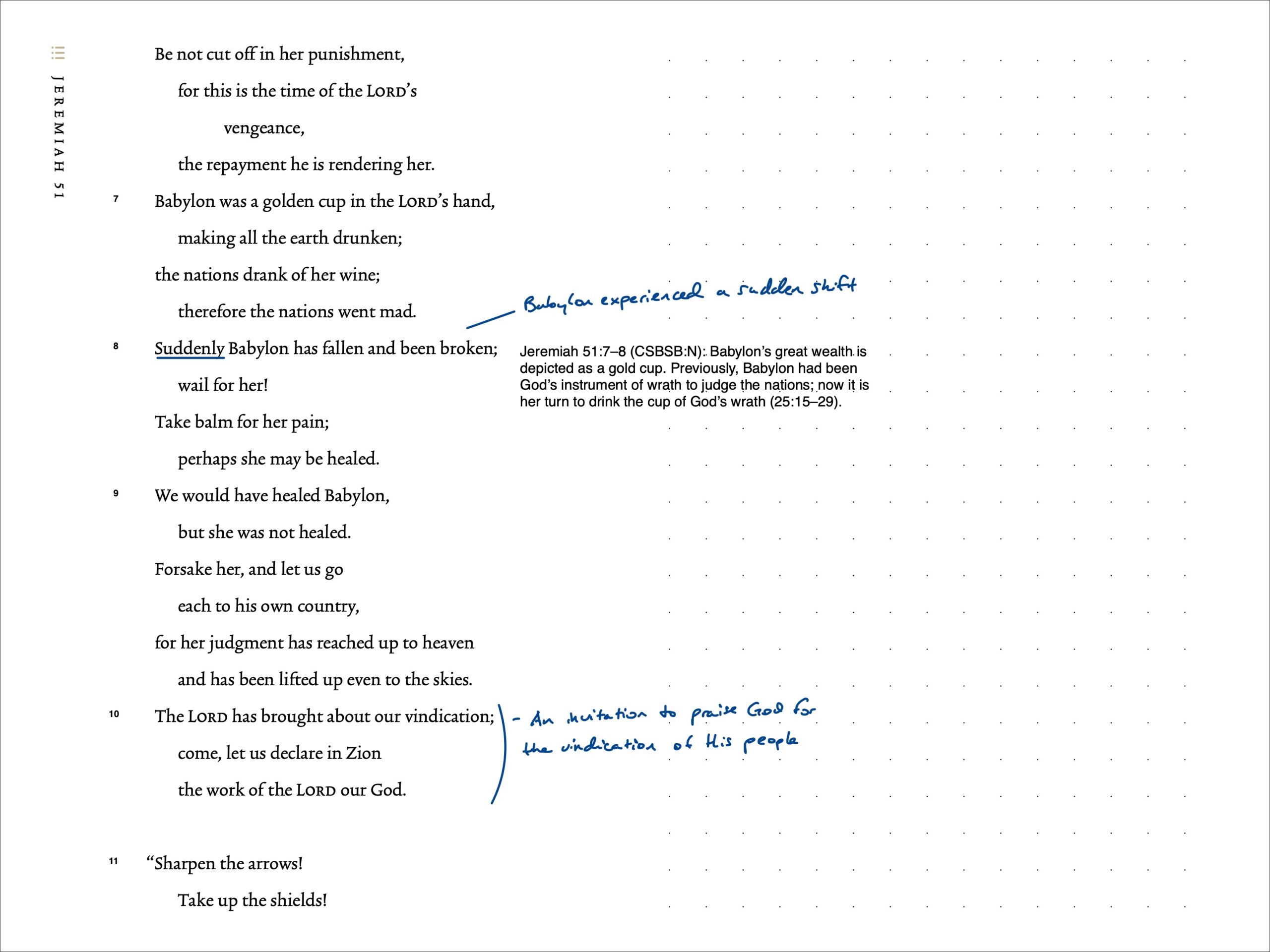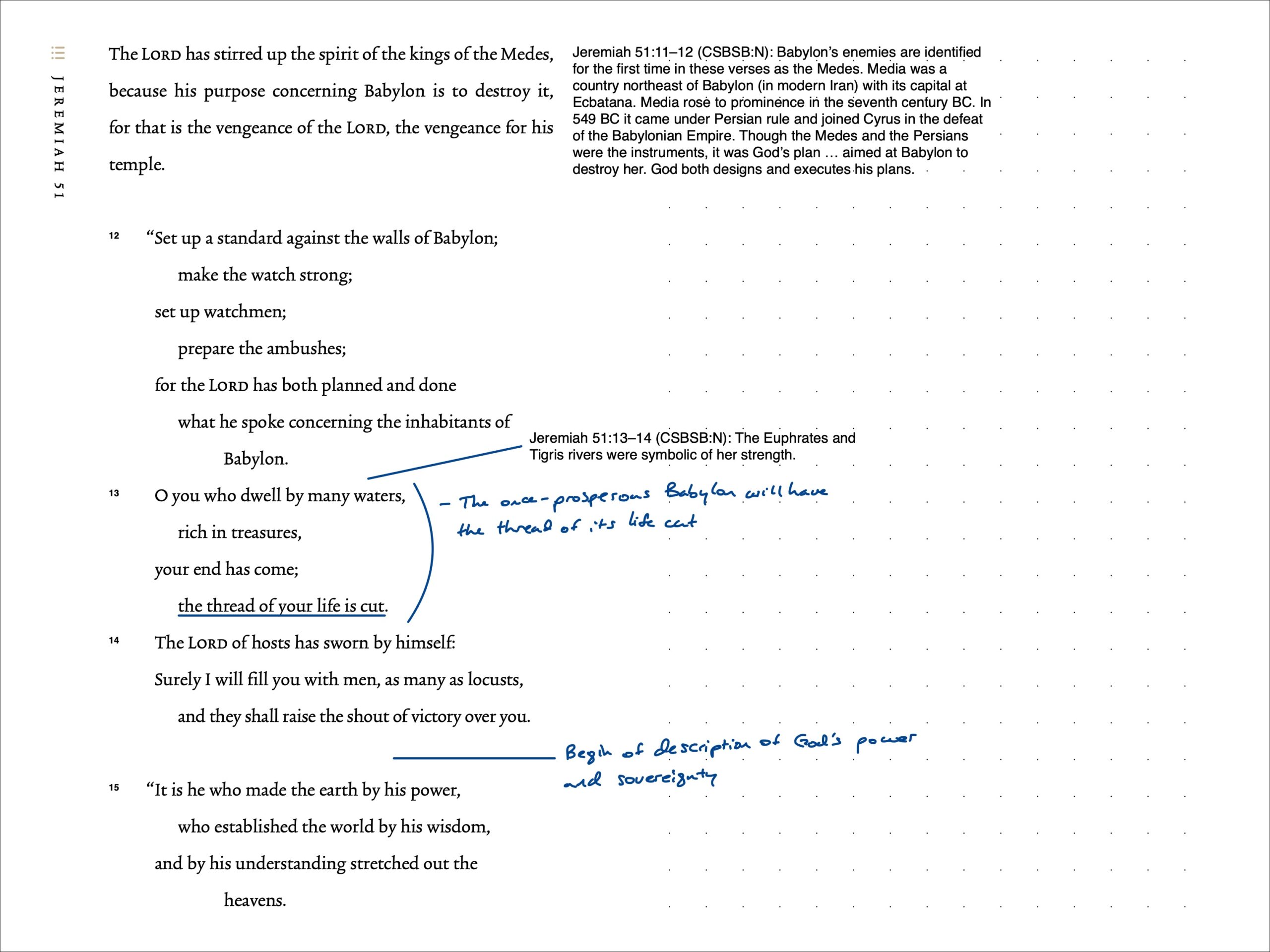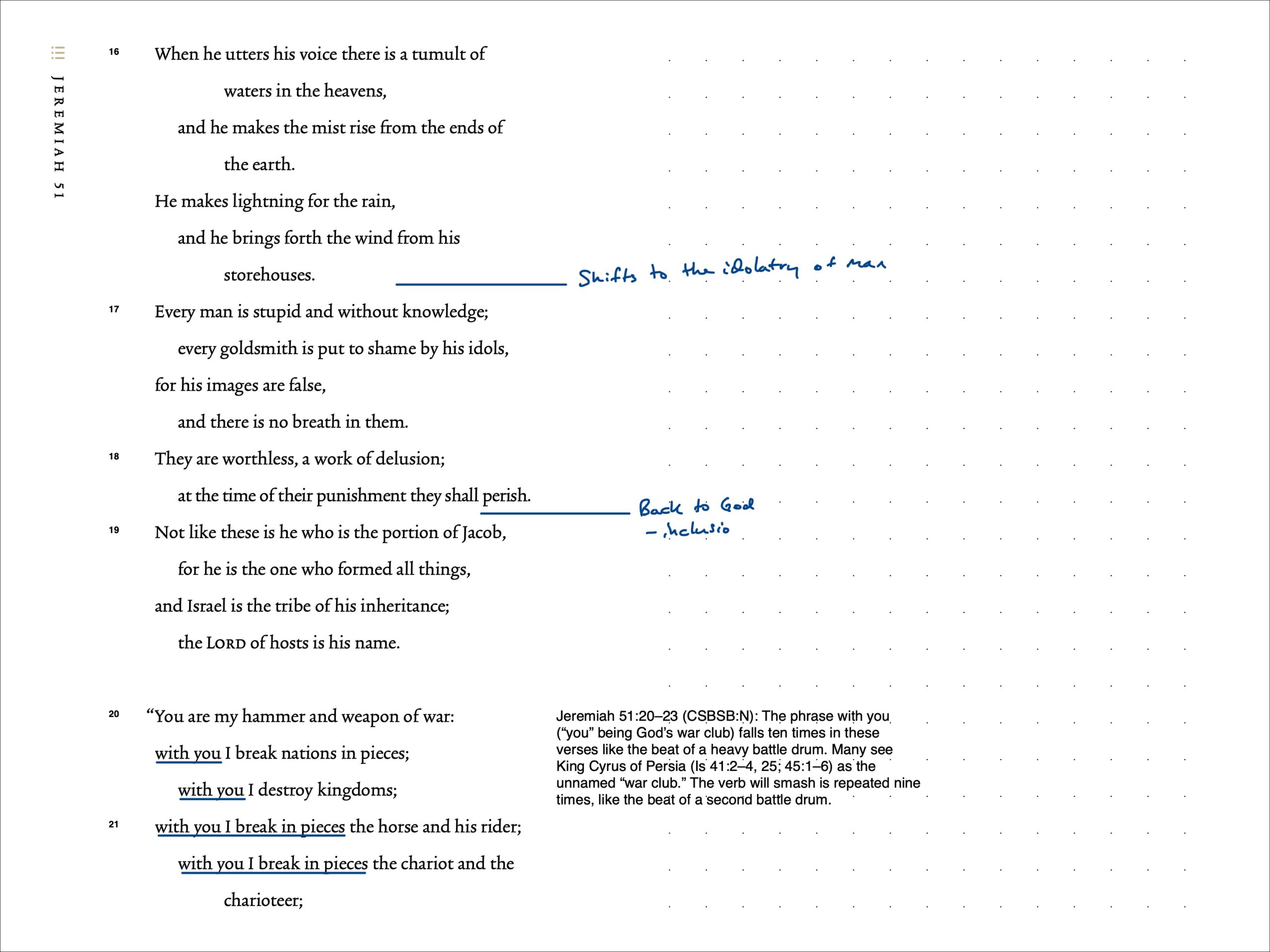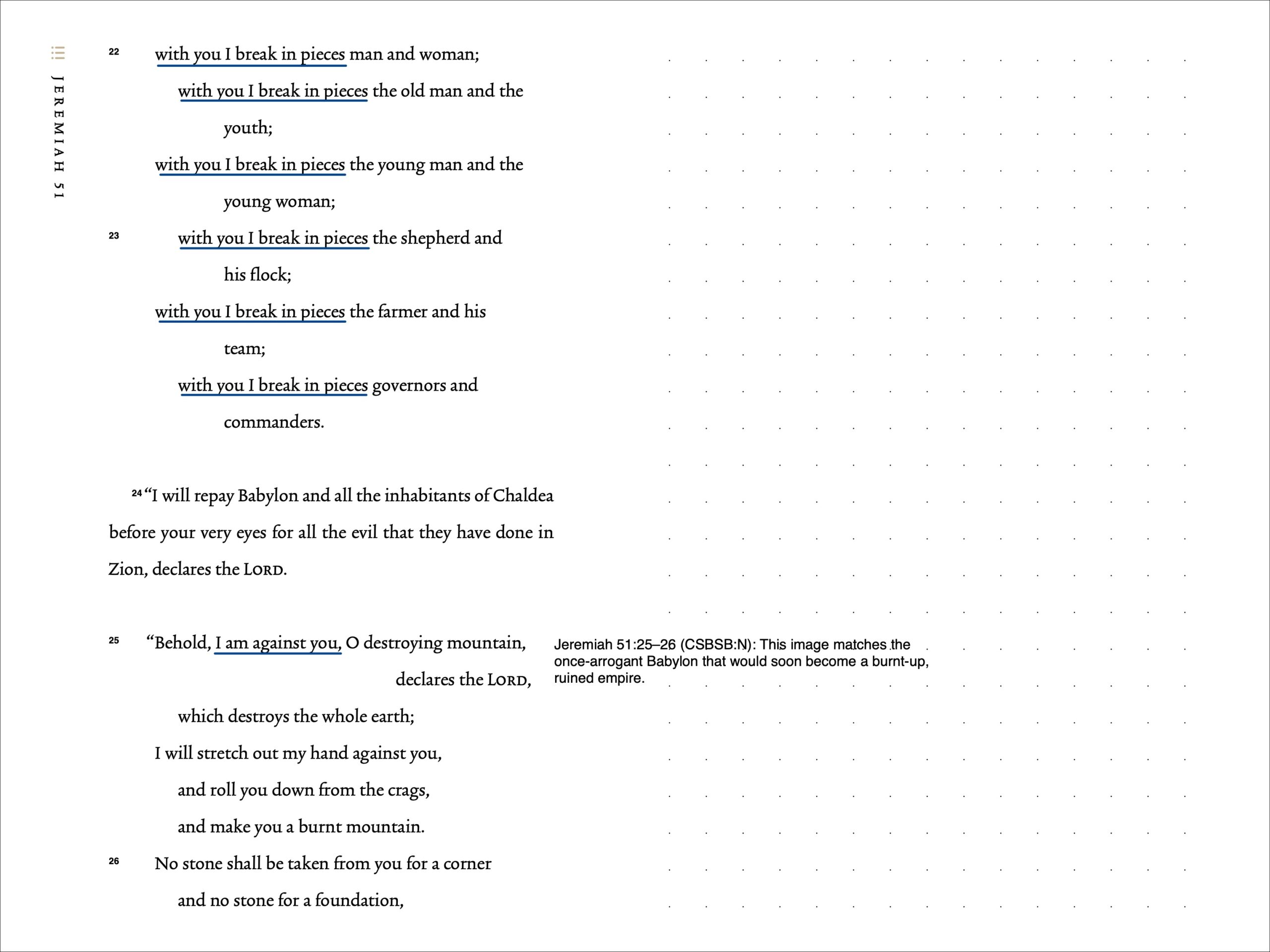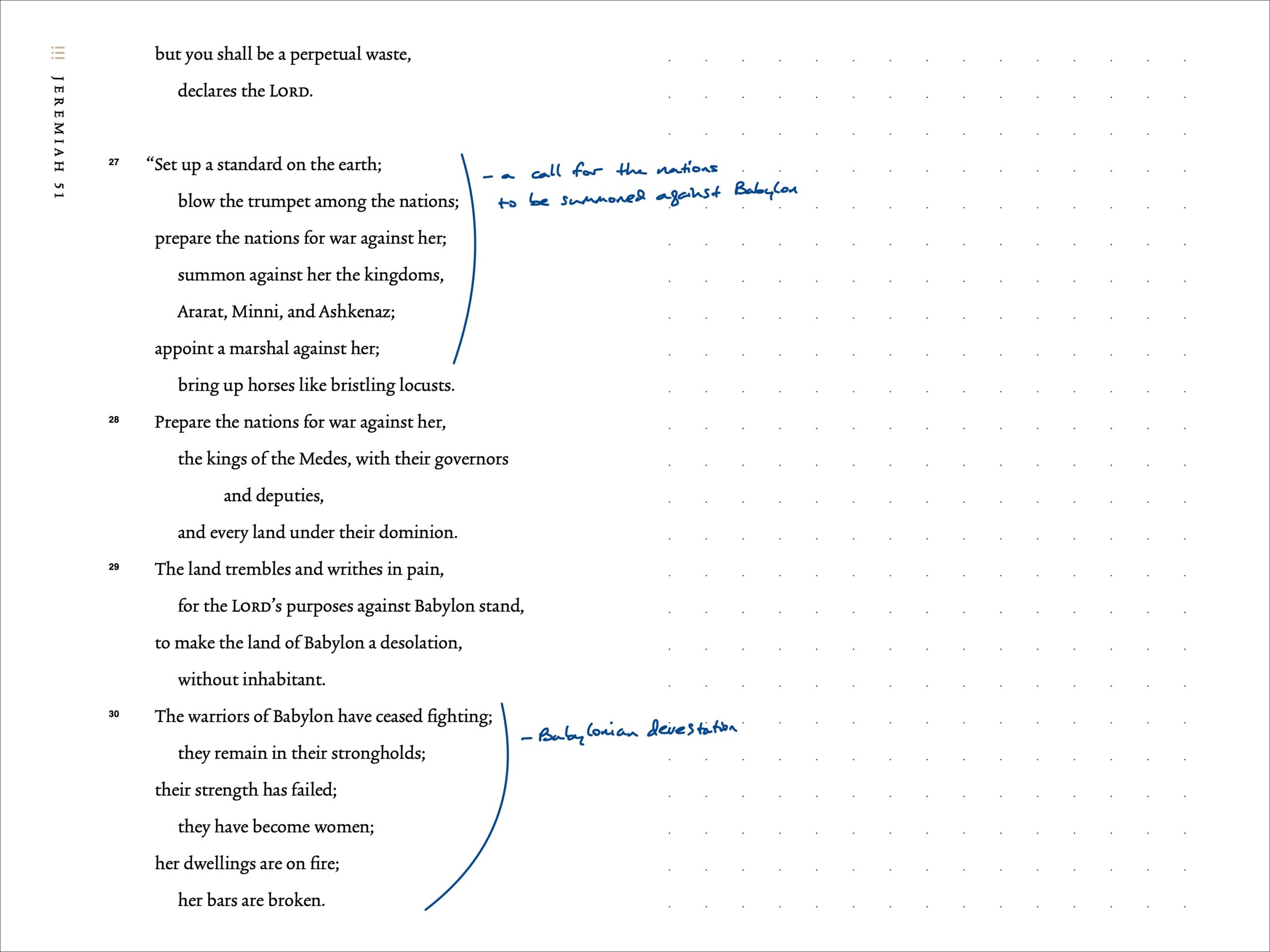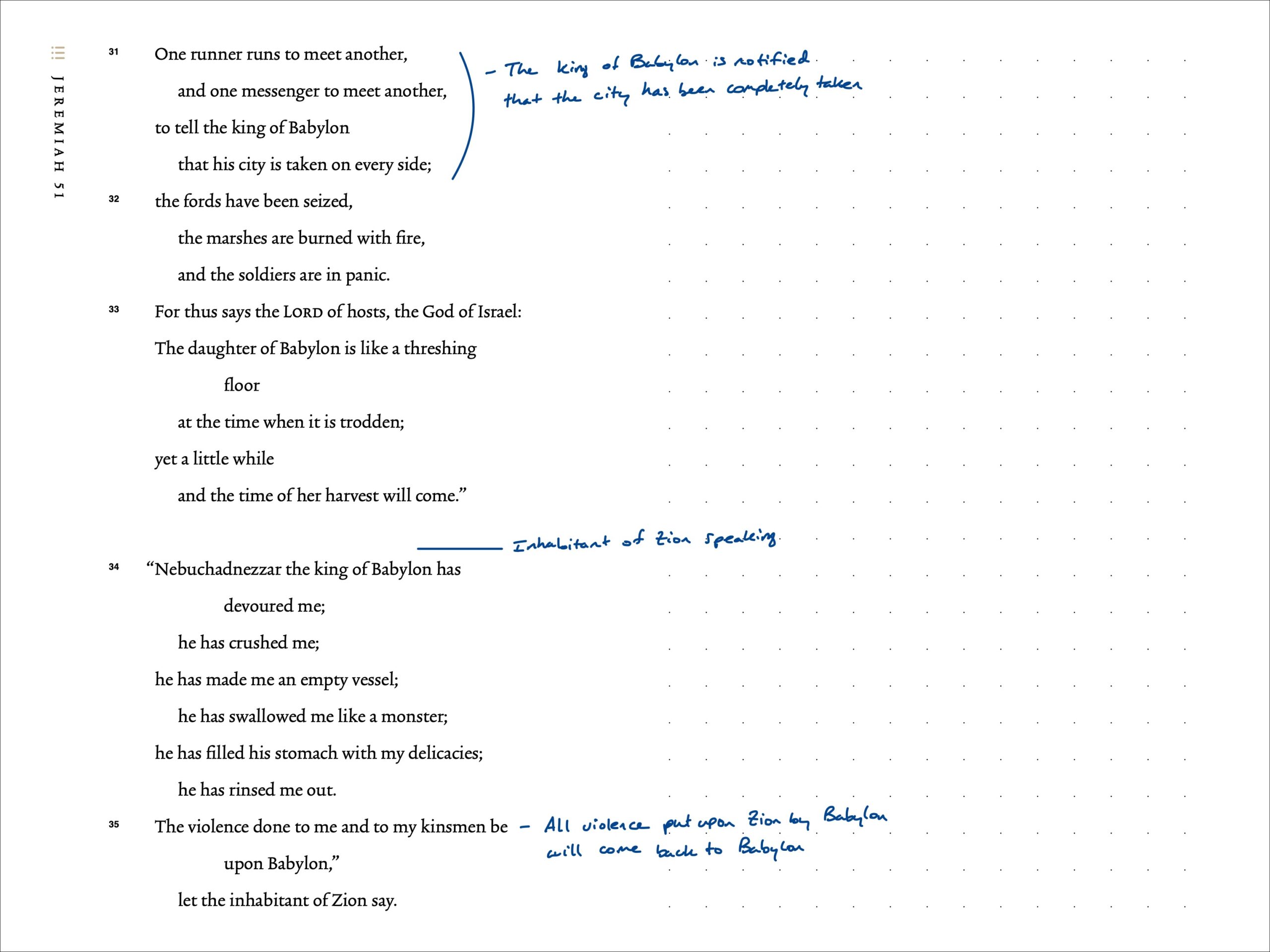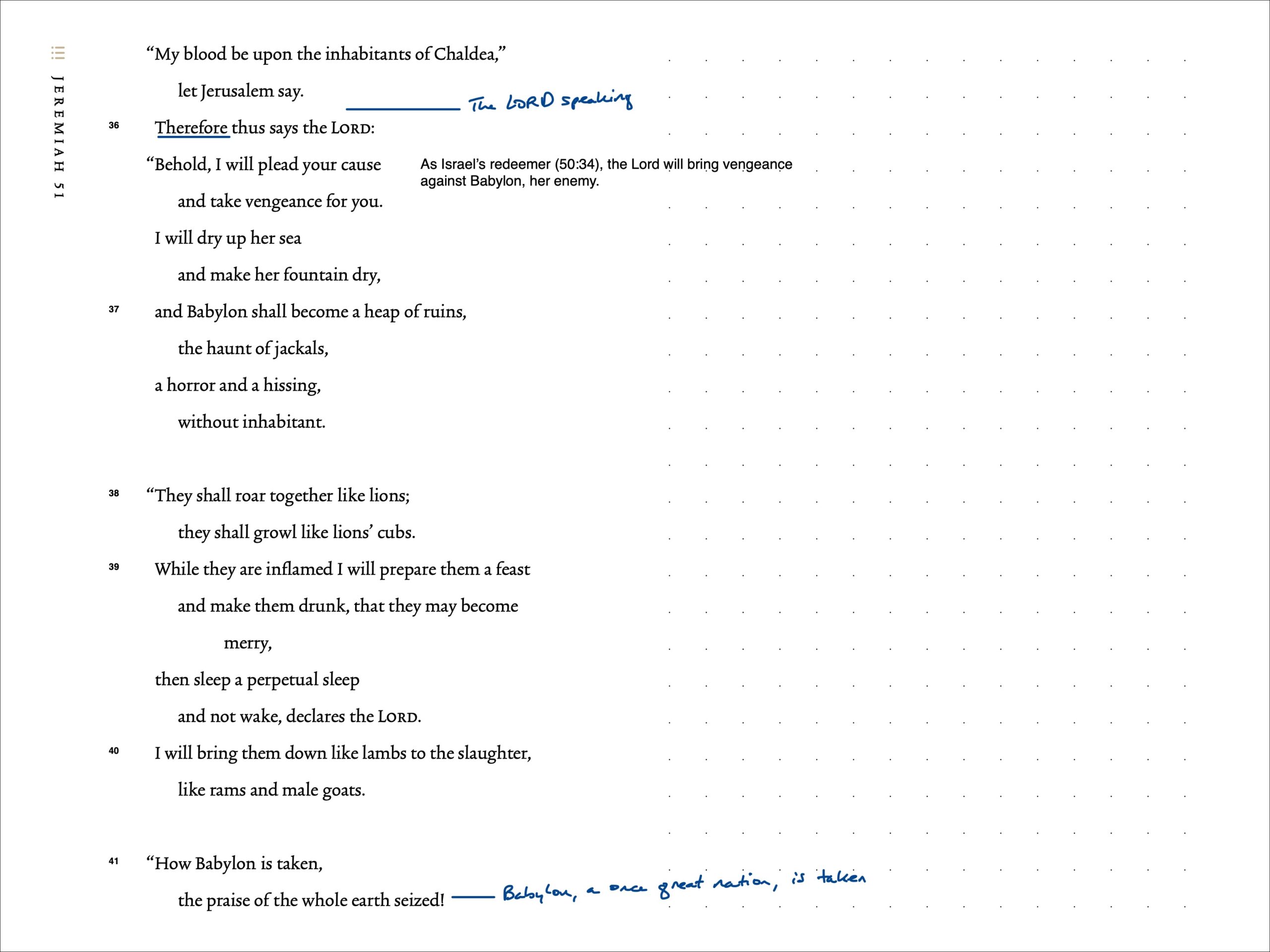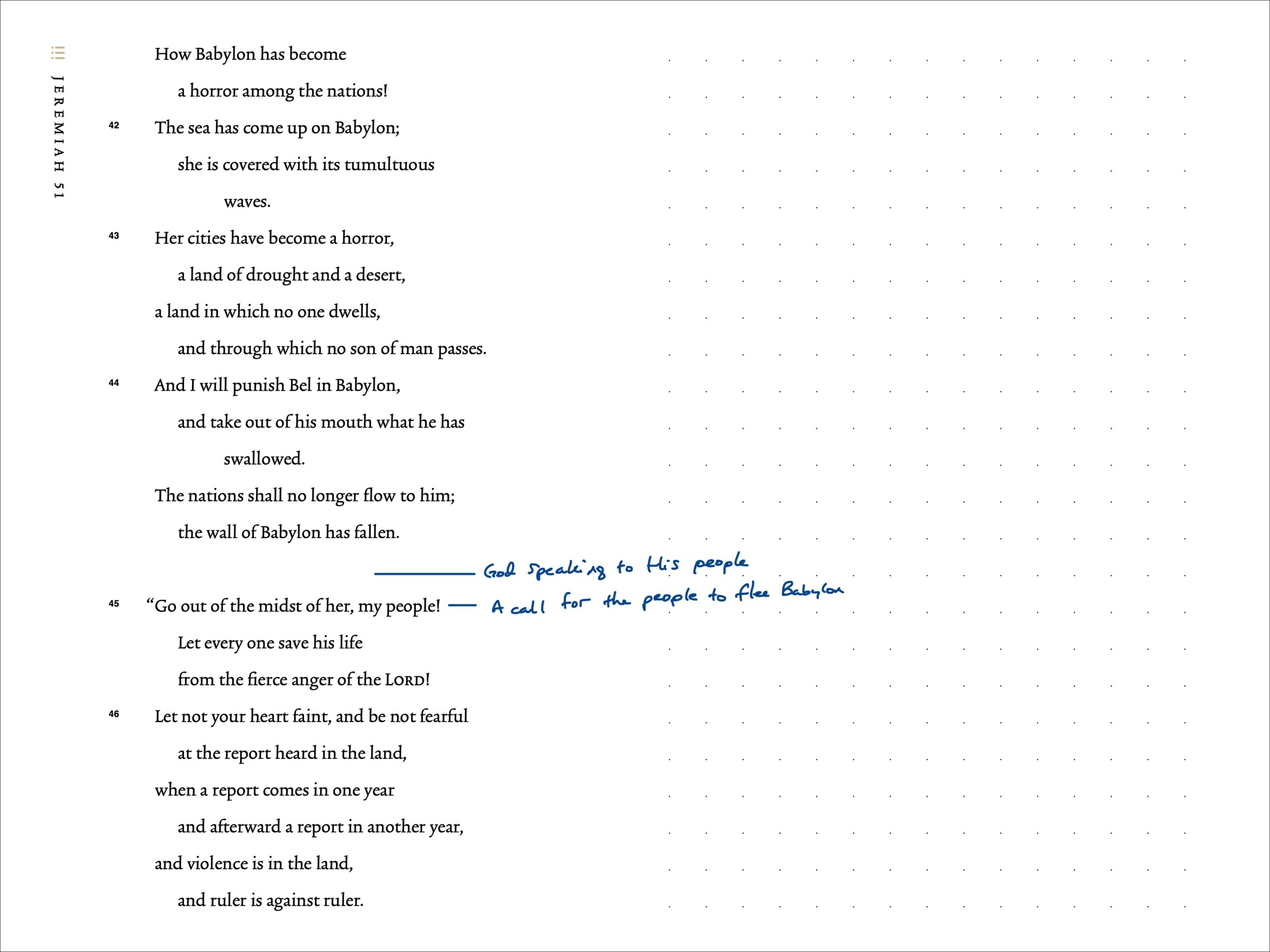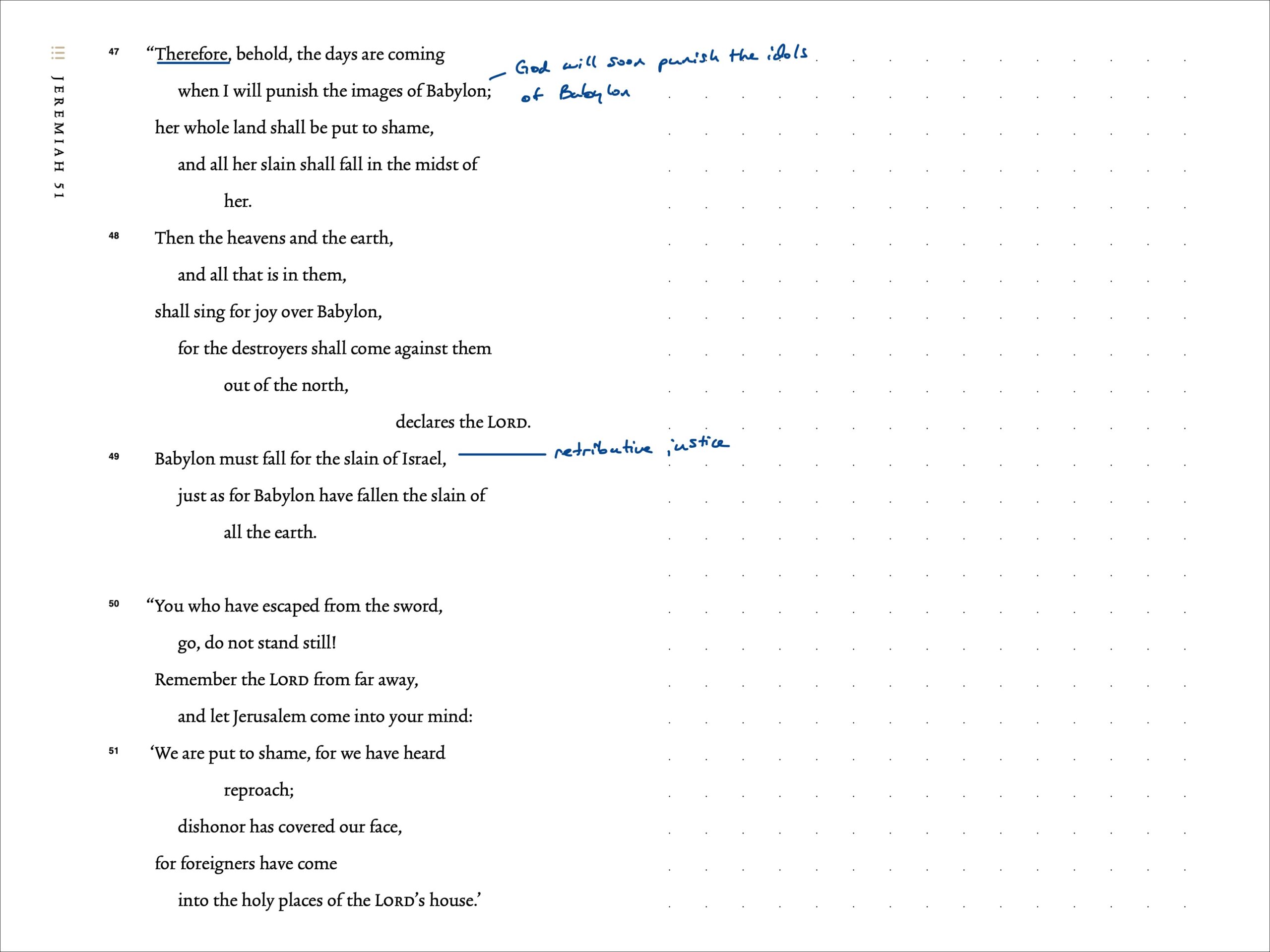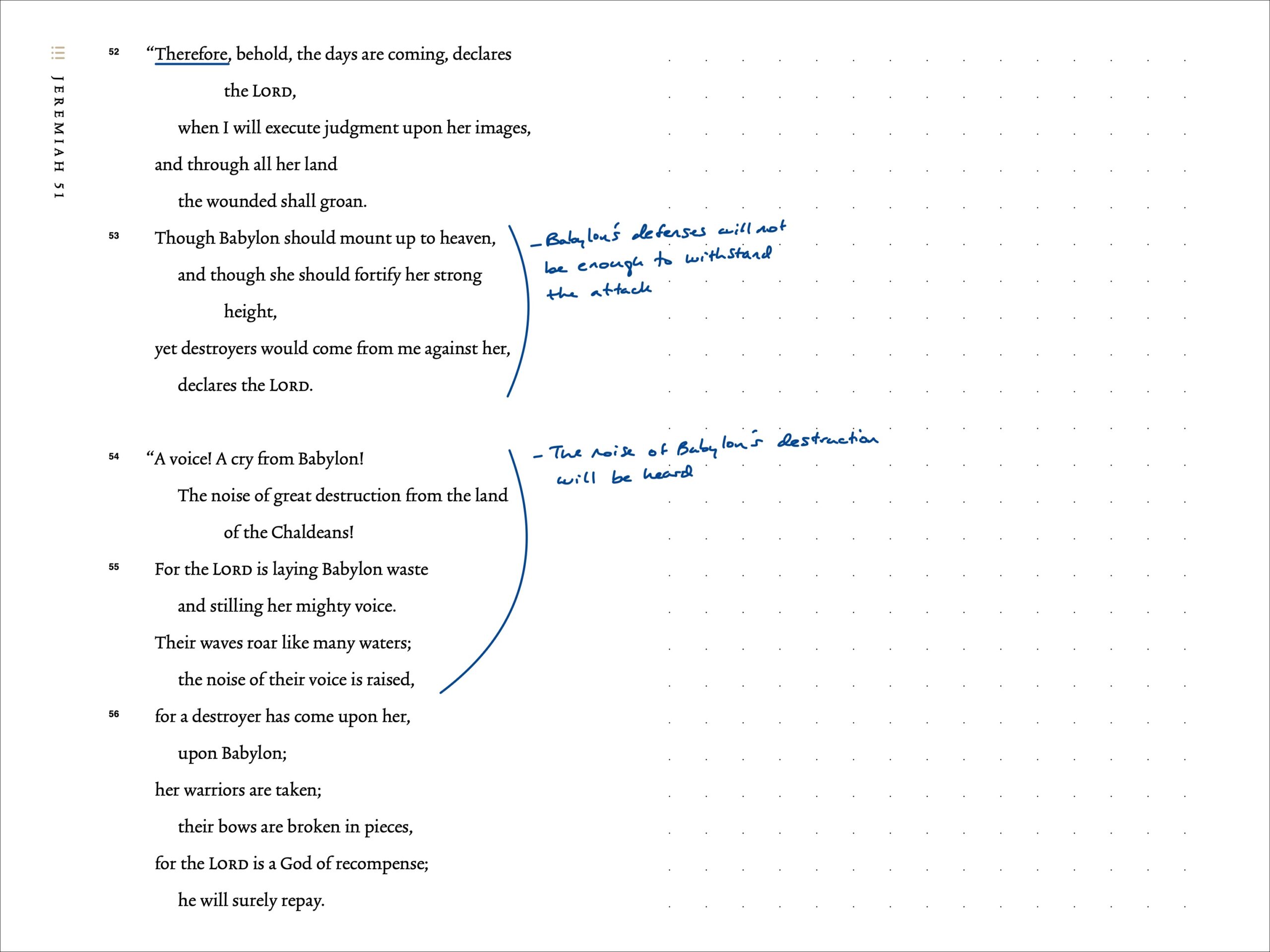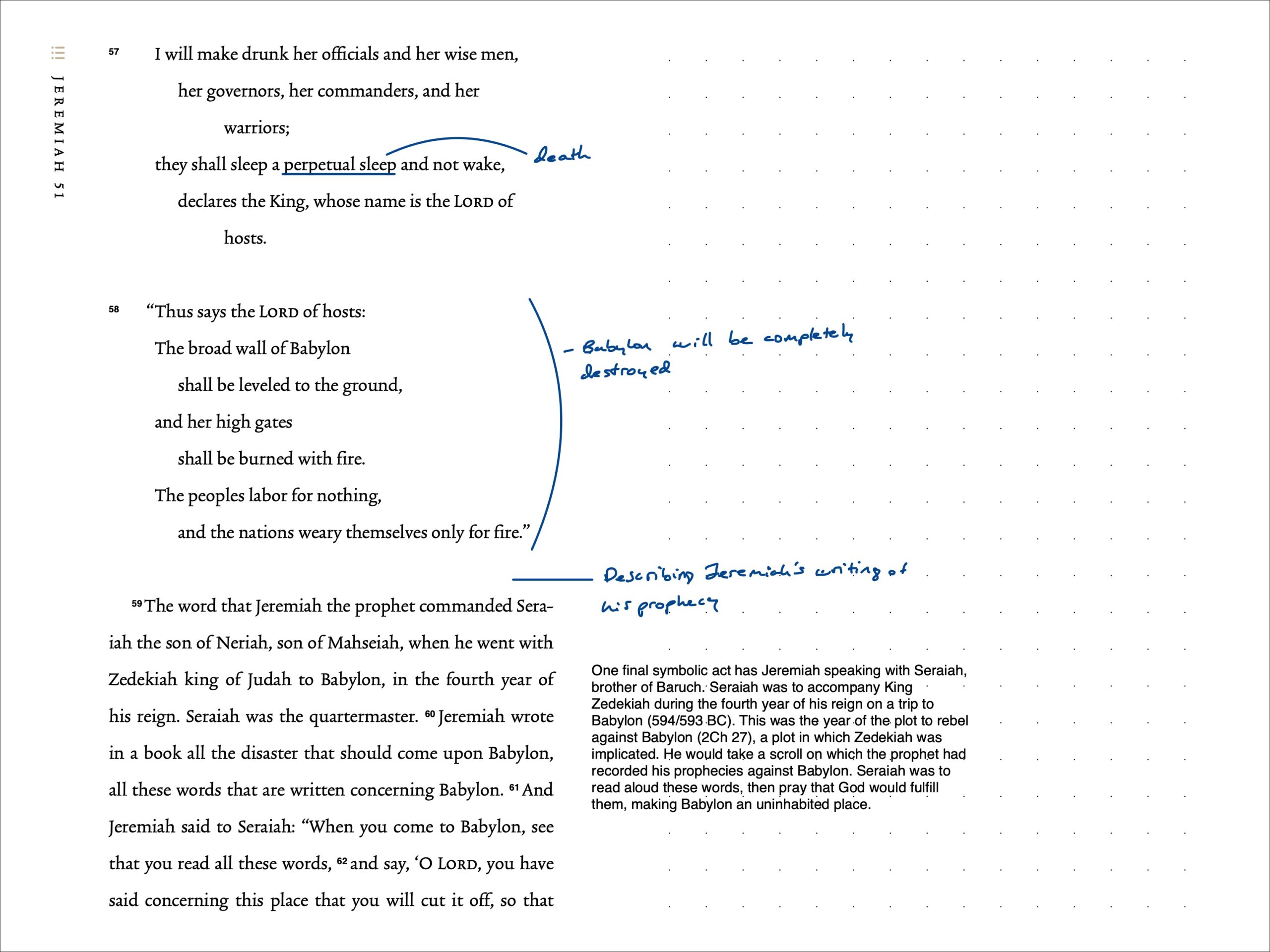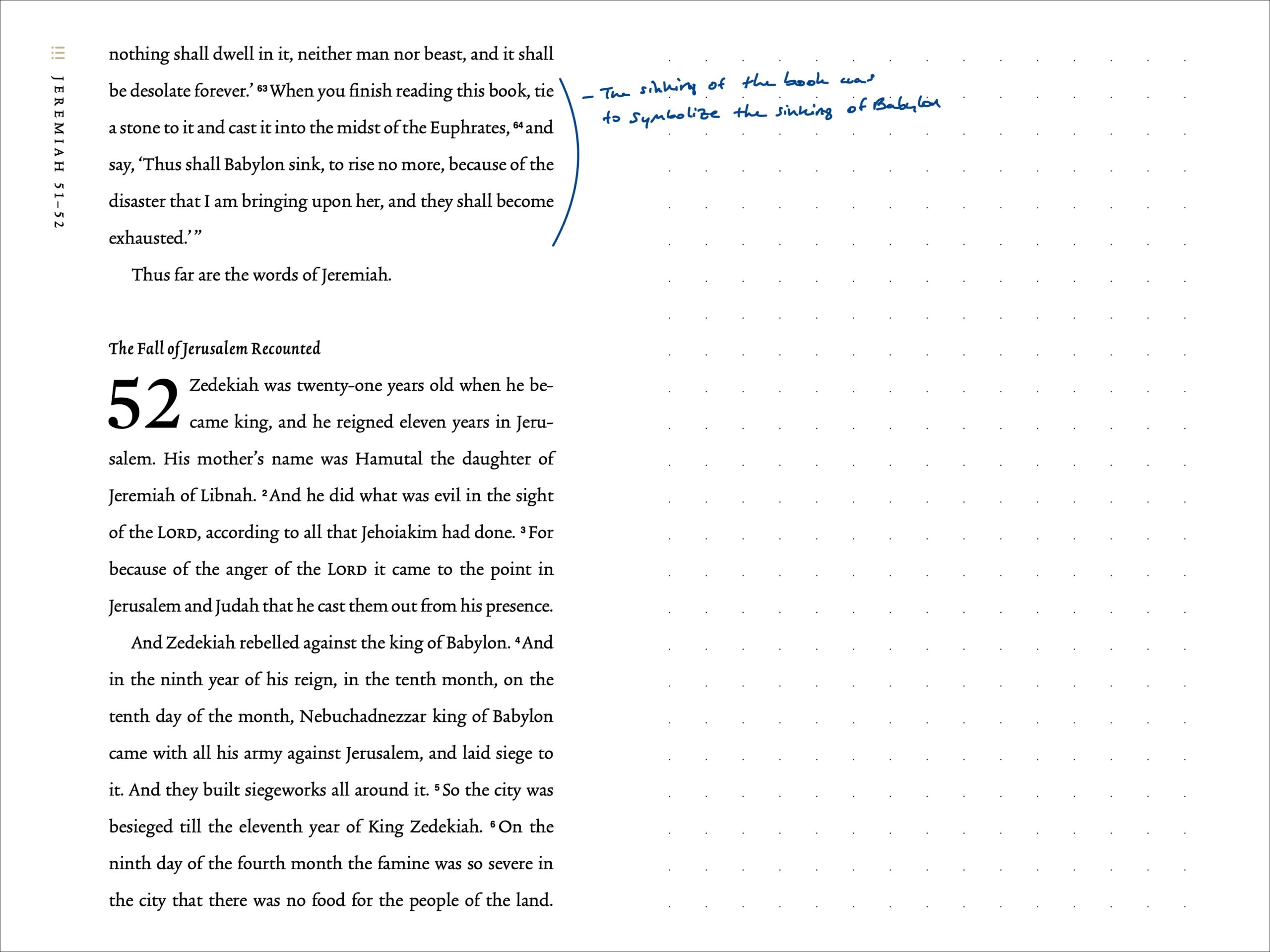| Date | Version | Reading Plan |
|---|---|---|
| @August 14, 2023 | ESV (2016) | ESV Prophets Plan 2023 |
Pericopes
- The Utter Destruction of Babylon
Notes
The chapter opens with a word of the LORD that He “will stir up the spirit of the spirit of a destroyer against Babylon”. He will send winnowers to separate wheat and chaff and none of the Chaldean army will be spared (Jer. 51:3). A clear separation is made that Israel and Judah had not been forsaken but the “land of the Chaldeans is full of guilt” (Jer. 51:5).
Jer. 51:6-10 is a call for the people to flee the midst of Babylon. She was once a golden cup in the LORD’s hand but now has suddenly fallen and been broken (Jer. 51:8). The people are invited to praise God for the vindication of His people (Jer. 51:10).
In Jer. 51:11-12, Babylon’s enemies are identified for the first time as the Medes. Media was a country northeast of Babylon (in modern Iran) with its capital at Ecbatana. Media rose to prominence in the 7th century BC and, in 549 BC, it came under Persian rule and joined Cyrus in the defeat of the Babylonian Empire. God used the Medes and Persians as instruments of destruction.
In Jer. 51:12-14, the command is made to “Set up a standard against the walls of Babylon”. The once-prosperous Babylon, dwelling by many waters (the Euphrates and Tigris rivers), will have the thread of its life cut (Jer. 51:13).
Jer. 51:15-19 is somewhat of an inclusio, beginning with the description of God’s power and sovereignty. It was He who made the earth and established the world by His wisdom (Jer. 51:15). It shifts to focus to the idolatry of man in Jer. 51:17 and his worthless idols and then contrasts this with the portion of Jacob who is the “one who formed all things” in Jer. 51:19.
Jer. 51:20-23 presents a literary device, repeating “you” (likely King Cyrus) that God used as a war club against Babylon. The repetition of “with you I will destroy” or “with you I will break in pieces” represents the beating of a heavy battle drum.
Jer. 51:24-30 is of God speaking against Babylon, that He is against them and will stretch out His arm against them. He calls for the nations to be summoned against Babylon to prepare for war against her. (Jer. 51:27). The strength of Babylon has failed and the Babylonian king is notified that the city has been completely taken (Jer. 51:31).
Jer. 51:34-37 begins with a command for the inhabitants of Zion to speak of how the violence that had once been against their kinsman to now be upon Babylon. The Lord responds in Jer. 51:36 that He will plead their cause and take vengeance for them. Babylon shall “become a heap of ruins and a haunt of jackals” (Jer. 51:37)
Jer. 51:38-44 continues in the discourse of Babylon’s destruction and the taking of a once-great nation. It has become a “horror among the nations” and “she is covered in tumultuous waves” (Jer. 51:41).
In Jer. 51:45-51 is a call for the people to flee Babylon and “Let every one save his life”. They are not to let their heart faint or be fearful as the days of Babylon’s destruction are coming. God will punish the idols of Babylon and her whole land will be put to shame (Jer. 51:47). Retributive justice is declared and Babylon must fall for the slain of Israel (Jer. 51:49).
Jer. 51:54-58 describes the noise and cries of Babylon’s destruction because the LORD is laying her to waste and “stilling her mighty voice”. They will sleep a perpetual sleep and not wake. Babylon will be completely destroyed and her broad wall “shall be leveled to the ground” (Jer. 51:58).
The remaining verses (Jer. 51:59:64) describe the writing of Jeremiah’s prophecy. In a final, symbolic act, Seraiah was to take the scroll on which the prophet had recorded, read the words aloud, pray that the LORD would fulfill them and then tie a stone to the book and “cast it in the midst of the Euphrates” (Jer. 51:63). Its sinking would symbolize the sinking of Babylon.
Application
The judgment of Babylon intensifies in this chapter. The Medes (to eventually be coupled with the Persians) are specified as the powerful force that will overtake the once dominating nation of Babylon. This historic account provides some helpful perspective for surveying our current national and international landscape.
On a practical level, there is a tendency to think of nations as being perpetual. For us in the prosperous west, it is difficult to grasp the level of tumult described in these chapters. We are several generations removed from suffering of this scale and there are only a handful still living who who can claim experience. This can dull and/or warp our perspective, leading us to think highly of ourselves and that what we have now will carry on indefinitely.
The truth is that it is God who sets the course for the nations; choosing to bless whom He will for the maximization of His glory. This ought to healthily crush us, leading to deep gratitude that He created us to live in such an affluent time and nation. However, this is not without purpose. Our calling as His ambassadors is not contingent on circumstance. We are to share the gospel and proclaim that there is no comparison of worldly peace to the peace of God that surpasses all understanding.
Scripture Journal Notes
Commentaries & Resources Used
- ESV Study Bible. (Wheaton, IL: Crossway, 2008)
- Faithlife Study Bible (Lexham Press, 2016)
- Believer’s Bible Commentary (Thomas Nelson, 2016)
- CSB Study Bible Notes (Holman Bible Publishers, 2017)
- Matthew Henry’s Commentary on the Whole Bible (Guardian Press, 1976)
- The Bible: A Reader’s Guide (Sterling Publishing, 2011)
- The Infographic Bible (Zondervan, 2018)
- ESV Digital Scripture Journal (Crossway, 2019)

